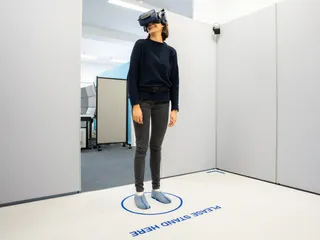Lufthansa Aviation Training Unveils First D-CEET VR Prototype At EATS 2025
Contact Our Team
For more information about how Halldale can add value to your marketing and promotional campaigns or to discuss event exhibitor and sponsorship opportunities, contact our team to find out more
The Americas -
holly.foster@halldale.com
Rest of World -
jeremy@halldale.com

Lufthansa Aviation Training (LAT) will present for the first time the VR prototype of its research project D-CEET (Digital Cabin Emergency Evacuation Trainer) at this year’s European Aviation Training Summit (EATS).
The project, with a total volume of €2.4 million, is funded by the German Federal Ministry of Transport (BMV) and co-financed by Lufthansa Aviation Training. It is being developed in collaboration with the geoGAZElab at ETH Zurich, Edelweiss, and PACE Aerospace Engineering & Information Technology GmbH. PACE, a member of the TXT Group, serves as the technology partner for developing the digital twin of an Airbus A320neo.
D-CEET is being developed in close coordination with ICAO and European aviation authorities. ETH Zurich provides scientific validation and ensures the highest methodological and ethical standards through its geoGAZElab. The project aims to set new benchmarks in cabin crew training and to evaluate the effectiveness of immersive learning environments through scientific research.
The first VR prototype will be showcased at EATS 2025 from November 4–6, 2025.
It features the Emergency Evacuation Land Scenario, one of a total of 15 digital training modules covering dynamic situations such as decompression, firefighting, and evacuation procedures.
All modules are part of a fully virtual, modular training system that allows variable difficulty levels and can be customized to specific airline procedures and brand identities. The concept is complemented by a mobile app that supports personalized learning and integrates the VR training into a holistic digital learning ecosystem.
D-CEET is aligned with ICAO’s recommended Competency-Based Training and Assessment framework, focusing on the development of measurable performance competencies. The VR environment allows for precise observation of behavioral indicators and supports objective, scalable performance assessment. As such, D-CEET contributes significantly to the ongoing advancement of international CBTA standards in aviation.
“With D-CEET, we are creating a new dimension of learning – data-driven, immersive, and individually scalable. This allows us to combine the highest training standards with innovative technology and scientific validation," Sophie Cyba, Project Lead D-CEET, Lufthansa Aviation Training.
Together, the consortium aims to sustainably transform aviation safety and emergency training – paving the way toward a new generation of digital, evidence-based training solutions.


